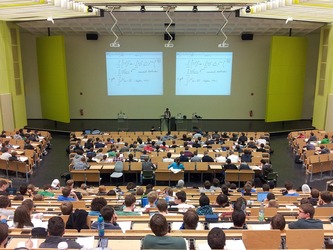
Our students finished their year by visiting a university. I found an empty classroom and asked them to enter and take a seat. The room seated 175 students in an elevated theater setting. At the front was a low stage with a demonstration table. They saw by the periodic table on one wall that this was a chemistry class, but not one like ours back at school.
I asked them if they thought the professor would come to your desk if you needed help. They realized that it was logistically impossible. “So how would you get help?” I asked.
Even if they do not attend college, only the slightest minority of them will work at jobs that don’t require teamwork and cooperation. In middle grades, these cooperative skills are often lacking or dysfunctional. I recently heard a teacher say that she didn’t like Common Core because middle school students don’t know how to work in cooperative groups. First of all, Common Core does not mandate cooperative grouping. It’s an effective strategy, but it’s not required.
More importantly though, if a student lacks a necessary skill, it is our job description to teach that. My students also come into the school year lacking this social skill. By the end of the year they have improved, but I’ll admit they generally aren’t experts. I’m looking for constant improvement in this, not mastery.
S.T.E.M. instruction provides a great venue for practicing cooperative learning. Whenever my students face a S.T.E.M. challenge, they have to work as a team. This may be a team of four or just a pair, but certain tasks require effort from both. They must each keep matching budget sheets. They calculate these independently and then compare results because math errors have a strong negative affect on their assessment. I often “shut down production” when an audit reveals a discrepancy. They must resolve that discrepancy to continue. This forces students to work in a cooperative environment.
Another advantage of cooperative grouping in S.T.E.M. instruction is that it fosters communication. Our brains are language processing organs. We learn through both oral and written language. If students were to work independently, they would never have the opportunity to process their learning through language. In fact, when students explain their thinking to one another instead of to the teacher (through a write-up) they have to be more precise. The reason for this is that I understand what they might mean whereas their peer may not. Thus they have to be more exact in their use of language.
We are not merely trying to help students master content; we are teaching a process. We are trying to make them capable of working successfully in this world without our assistance. I am looking to create students who eventually don’t need me. In one sense, I’m trying to work myself out of a job.
 RSS Feed
RSS Feed